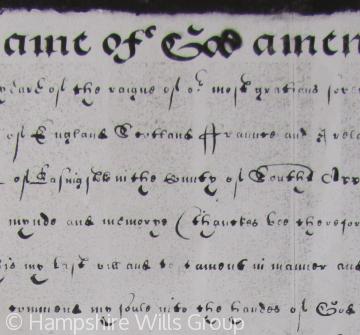Basingstoke Probate Material 1651-1660

One inventory and thirteen wills survive for this period, only one document is held in the Hampshire Record Office (HRO), the remainder are held at The National Archives (TNA). All bishoprics were abolished in 1646 following Parliament’s victory in the First Civil War 1642-6 and wills were proved in the Prerogative Court of Canterbury (PCC), archived in The National Archives, until the Restoration of 1660. Unusually, in Winchester, officials kept the probate service going in the late 1640s. Some of the wills reflect the difficult times of religious dissent and Civil War whilst others indicate considerable wealth with property held in Basingstoke, Berkshire and London. In fact at any time wills with property in more than one diocese had to be proved at the PCC.
These transcriptions have been made from copies of original probate documents supplied by HRO and TNA. Words have been modernized and punctuation added to make reading easier but names have been transcribed as written. Words in italics indicate omissions in the original document but which have been added to make sense of the text. Words in square brackets indicate that they have been transcribed as seen but where the meaning is unclear. Basingstoke is described as being in the county of Southampton, the old name for Hampshire. Links to all of the transcriptions are below.
A glossary is attached of unusual words.
- Roger Weston, senior, yeoman (Will and Inventory), 1653
- Thomas South, the elder, clothier (Will), 1653
- John Holmes, yeoman (Will), 1653
- John Aylwyn, Gent (Will), 1654
- Richard George, woollen draper (Will), 1656
- William Tempule, farmer (Will), 1656
- William Herne, clothier (Will), 1657
- William Pell, Gent (Will), 1657
- Jane Dovey, widow (Will), 1657
- James Wyther, Gent (Will), 1658
- Stephen Webb, minister (Will), 1660
- Richard Everad/Evered, tanner (Will), 1660
- John Kew, haberdasher and soldier (Will), 1660

